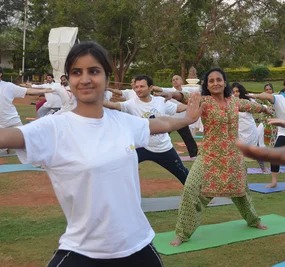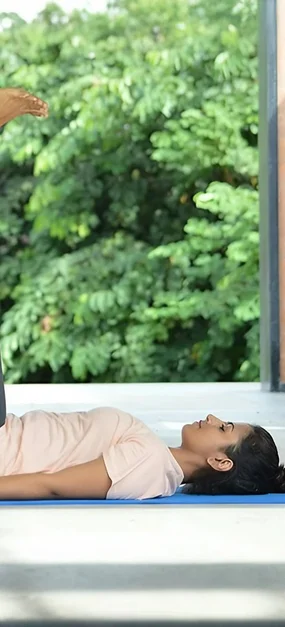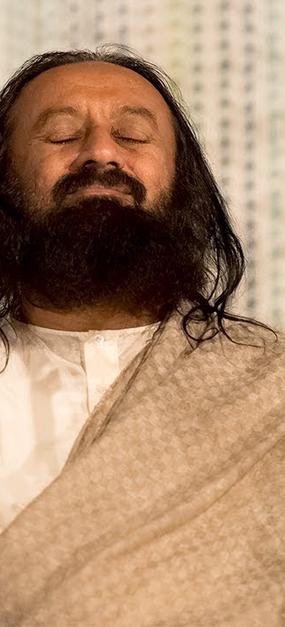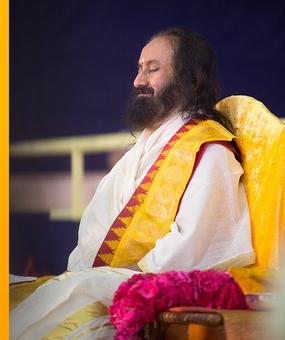“The purpose of yoga is not only to keep good physical shape but also to experience infinity. Each posture should be done keeping in mind that the goal of the posture is not just the correctness of the posture,but also to experience infinity. This starts happening to you with a little practice.”
~ Gurudev Sri Sri Ravi Shankar
Yoga is said to be the union of the mind, body, and breath. It’s a state of being when all these three aspects are integrated and put together.
Chanting deepens the practice of yoga and elevates the consciousness. It helps to calm the mind. A calm mind is more responsive and acts out of its best potential.
3 forms of chanting
The power of chanting has been there in different forms in traditions, cultures, and religions across the world.
In his discourse on the Patanjali Yoga Sutras, Gurudev says, “When we chant mantras loudly and together in a group, then it is called as Kirtana. When we recite in a normal or medium tone of the voice, then it is called as chanting. And when you recite quietly or very slowly in the mind, then that is called as Japa.”
All these three forms of chantings bring harmony in the body and mind. This is called the union. This is yoga of sound. A certain intonations of sounds when chanted in a specific manner creates the same harmony and a connection with our own consciousness.
Technology of sound and you
Sound is an aspect of life that is close to us. We heard our mother’s voice when we were growing in the womb, responded to the language of love when we were born and became more attentive to sounds as we grew up.
We respond differently to different kinds of sound. Different sounds produce different responses in us. For instance, you will feel like dancing when you listen to rock or a peppy Bollywood song, while light instrumental music will make you still and relax.
Similarly, when harsh or abusive words are heard or spoken, they have a disturbing effect on our being, mental state and internal system.
Imagine, if an abusive word can affect the system, what happens when we speak well? The Indian spiritual tradition of yoga and meditation has the best works of rishis – seers who mastered the mind and shared insights. Simple stuff, really. The mind responds to sounds that nurture and cultivate it.
And here is where chanting mantras come in.
Chanting: Yoga of the mind
Chanting is essentially logging onto the timeless technology of our ancient seers. They devised certain compositions using ancient sounds from the Sanskrit language. A few aspects of yoga and chanting:
#1. Each Sanskrit letter has a sound, which relates to a specific subtle energy center (chakra) in our subtle bodies. Sanskrit chanting activates subtle energy centers. Sanskrit chants are known to have soothing and healing effects on the human mind and body, leading to calmness.
#2. There is a great benefit in group chanting as well. As we sit together in one place, we have different thoughts. But, when we start chanting, there is one thought and one rhythm in all our minds. All minds become one. This oneness creates a profound energy that enlivens us.
#3. Chanting, when done in the proper manner, allows all other senses to dissolve into one, and allows the mind to sync into itself. Chanting can be considered as the yoga of the mind.
#4. While chanting can be done at any time and any place, best effects are experienced when the ambience is right.
#5. To maintain the subtle effects of the chants, they are revered and chanted in holy places across the world.
#6. There are many simple chants that everyone can chant and experience the energizing effect.
What is Om?
Om is considered to be the sound of the Universal Consciousness. Chanting Om aligns your small mind (you) to the bigger mind (the Universal Consciousness), creating more harmony in your life.
Chanting Om, creates vibrations throughout our body, elevating prana – the life force energy in the body.
More prana essentially means more life force energy flowing through us. More energy translates into more connection with ourselves, more clarity of mind to make decisions, more awareness in our relationships. Essentially, a happier you.
11 Tips for your daily yoga practice and chanting
Like our yoga practice, we need to allot time and space to sit and chant each day. Over time, our yoga space becomes peaceful. Chanting mantras also enhances the serenity and calmness of the space.
A few things to take care before we start chanting:
- Decide a comfortable place to sit for chanting.
- Sit in sukhasana
- Keep the spine erect and shoulders relaxed.Keep your eyes closed till you complete the chants.
- If you already have an altar where prayers are done, then you can face that altar and chant.
- While chanting keep your focus on the breath.
- Including chanting after a yoga session is the best way to go deep into meditations.
- It is okay if the mind wanders. Allow it and do not resist.
- Many traditions have rosary beads, rudraksh beads which have set numbers. This is proven to be a good method of chanting too.
- Once in a while it is good to chant in a group also. The group has more energy.
- Yoga is a relationship that you cultivate with yourself. And
Chanting mantras is an additional means of strengthening that relationship.





















